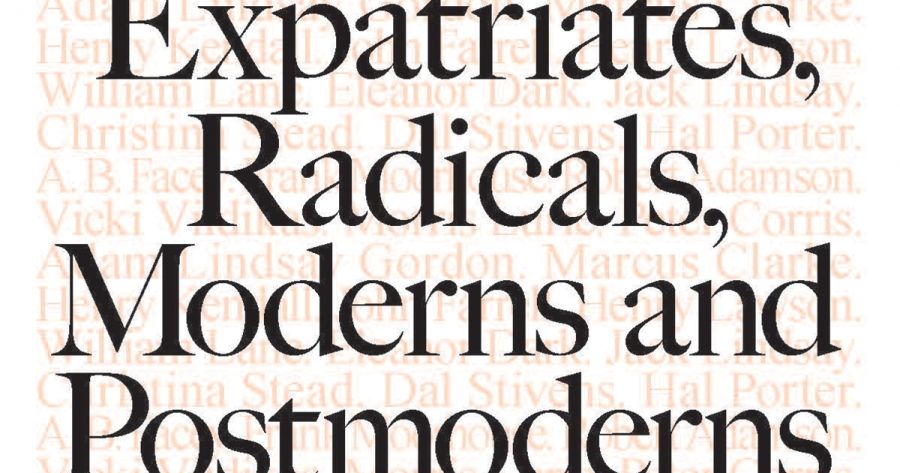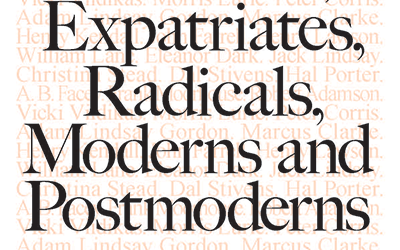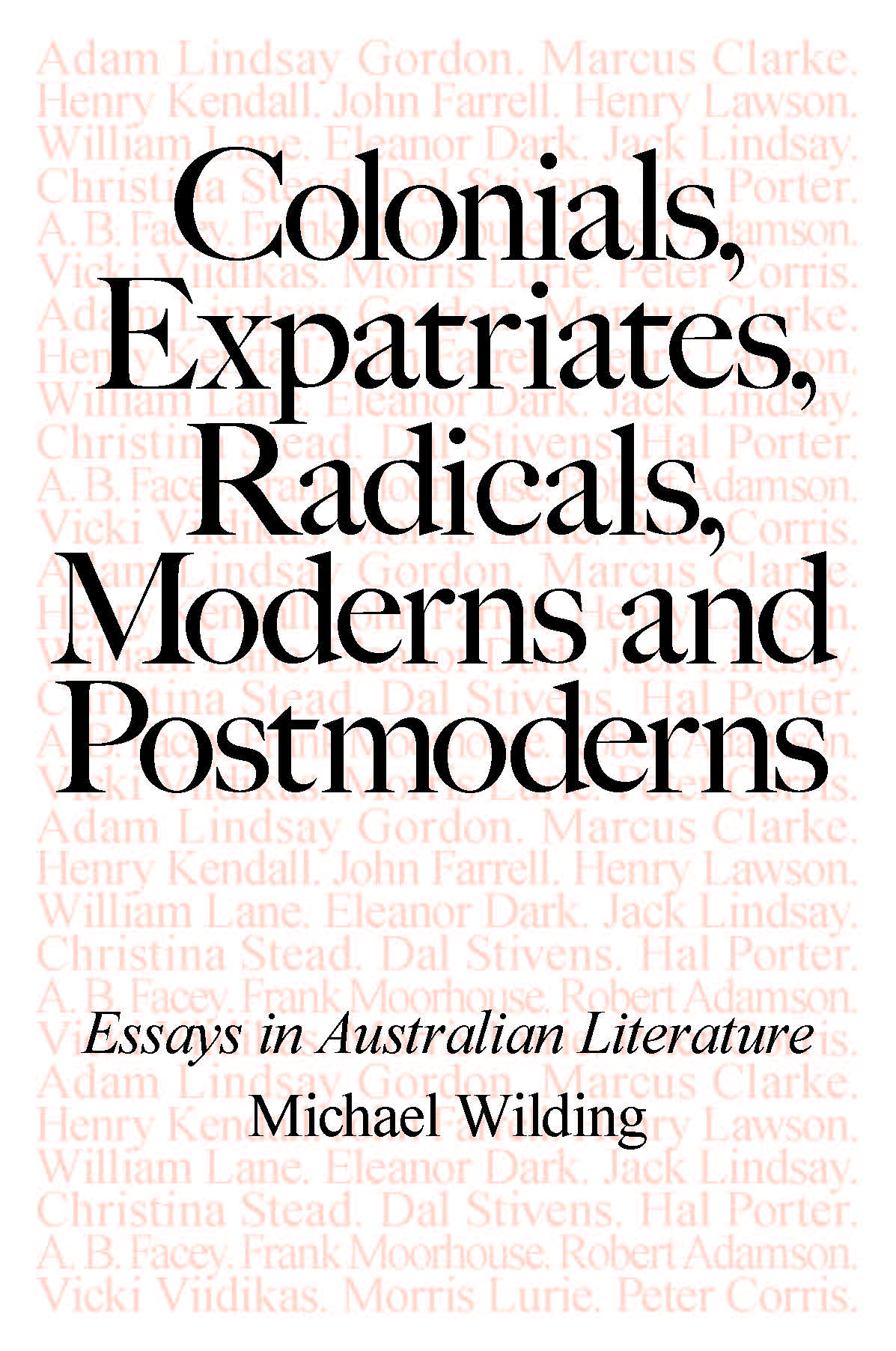
- Free Article: No
- Contents Category: Literary Studies
- Review Article: Yes
- Article Title: ‘The burnt-up banks’
- Article Subtitle: An Australian literary scholar
- Online Only: No
- Custom Highlight Text:
Anyone who has read Michael Wilding’s book Milton’s Paradise Lost (1969) will remember what an intelligent and generous critic he is. That book was part of the revival of Milton scholarship in the 1960s, with its skilful reading of the poem’s enigmas: Satan’s humanness, the problems with God. It was also cheering to read Wilding’s scolding of T.S. Eliot and F.R. Leavis for their superficial and prejudicial readings of the poem.
- Featured Image (400px * 250px):

- Alt Tag (Featured Image): Philip Mead reviews ‘Colonials, Expatriates, Radicals, Moderns and Postmoderns: Essays in Australian literature’ by Michael Wilding
- Book 1 Title: Colonials, Expatriates, Radicals, Moderns and Postmoderns
- Book 1 Subtitle: Essays in Australian literature
- Book 1 Biblio: Australian Scholarly Publishing, $55 pb, 310 pp
- Book 1 Cover Small (400 x 600):

- Book 1 Cover (800 x 1200):

- Book 1 Readings Link: https://www.readings.com.au/product/9781923068766/colonials-expatriates-radicals-moderns-and-postmoderns-essays-in-australian-literature--michael-wilding--9781923068766#rac:jokjjzr6ly9m
Wilding was born in Worcester, went to the same school as Adam Lindsay Gordon, and was educated at Oxford. He emigrated to Australia twice, once in 1967 and then again in 1969, both times into the arms of Sydney University. Although he retained his scholarly interest in early modern English literature – Shakespeare and Marvell – he has made a career, predominantly, in Australian, Asian, and Pacific creative and critical writing. He is well known for his many novels and short story collections, with their tales of adventure in Sydney libertarian culture and their metafictional experiments. Some of his work has also had a sharp, satirical edge, summed up in the unforgettable title of one of his novels: Academia Nuts (2002). He has done much editorial and critical work in Australian literature as someone interested in colonial writing, particularly Marcus Clarke, and in his version of the radical tradition: Henry Lawson, Joseph Furphy, and Christina Stead.
This book is a collection of his critical writings, from 1966 until about 2020, that have appeared previously in various journals, magazines, and newspapers. Wilding has been an important and distinctive critic of Australian writing, and this collection is a reminder of how literary criticism is an important process in our understandings of history and of where we are in the present. Wilding’s readings of Adam Lindsay Gordon, Henry Kendall and Marcus Clarke, for example, are biographically and archivally detailed investigations of the styles and moods of early colonial writing. The lives of these colonial writers and the others Wilding writes about continue to tell us much about social and political character of early settlement. Gordon suffered from a morbid melancholy, and a sense that he was ‘not in any useful career’, no doubt leading to his suicide in 1870. Something about Gordon’s poetry appealed to Sir Edward Elgar, who set more than one of his poems to music. ‘A Song for Autumn’ includes a line that seems distinctly antipodal: ‘When the burnt-up banks are yellow and sad.’
As a schoolboy in Highgate, Marcus Clarke collaborated with his friend Gerard Manley Hopkins on ‘a Gothic tale involving alchemy and the reanimation of the dead’, and in colonial Australia he experimented with drug literature in what Wilding refers to as the ‘amazing tour de force “Cannabis Indica: A Psychological Experiment”’, published in the Colonial Monthly in 1868. For the Term of His Natural Life (1874), Clarke’s great serial novel of retold tales, is a complex re-imagining of the romance genre, including colonial sources for the ‘hallucinatory horrors of conscience. Wilding emphasises how well read in contemporary American literature Clarke was and how important Bret Harte was to him in his ambition to ‘create a new literature for a new country’. Wilding sees parallels between Kendall and Robert Adamson, not just in their sharing of the restorative environment of the Mooney Mooney Creek and the Hawkesbury, but also in their address to the question of what does a poet do in society? Like Adamson, Kendall, uneasy about making himself the centre of his poems, ‘tried to materialise his belief in the social function of the poet’, even if he didn’t succeed. Wilding’s essay on the poetry of Adamson and the spirit of Kendall, the Herbert Blaiklock Memorial Lecture of 1986, has as its epigraph a bizarre memory of A.G. Stephens about Kendall in the Bulletin in 1896. Philip Holdsworth, a friend of Kendall’s, went to a Sydney police station to pay the indigent Kendall’s fines, only to be told he had gone missing. But Kendall was in fact being held in one of the cells, and called out: ‘My name’s Rickeybockey.’ Was this just a bit of random word salad, or some esoteric allusion of Kendall’s to his incarceration?
Wilding is a critic who enjoys explicating the historical and social contexts of literary texts and their didactic effects. His 1980 introduction to William Lane’s novel The Workingman’s Paradise, reprinted here, is a standout in this collection. It includes biographical details of Lane’s English birth, his migration to America before he was sixteen, his influential work as a journalist in Brisbane and Sydney, his serialisation of Edward Bellamy’s utopian novel Looking Backward 2000-1887, and discussions of Karl Marx, in The Worker. Wilding’s introduction shows how Lane’s writing was a response to the divisive, tumultuous events of the 1890s, such as the maritime and shearers’ strikes, and an expression of socialist political consciousness. He explains how Lane’s fiction has an educational purpose, but at the same time how its dialectic is a sophisticated representation of both the exploitative working and living conditions of the Sydney poor and of the coterie of middle-class left intellectuals, including the women’s movement, of the leafy harbourside. The epilogue to the novel is Lane’s abandonment of Australia in favour of the utopian, racist, escapist chapter of the Paraguayan experiment called The New Australia. Lane’s novel is a rich encapsulation of the history that has created the contemporary world.
The literary representation of poverty also guides Wilding’s interest in Christina Stead, an author he knew and whom he writes about with great insight. Stead’s first novel, Seven Poor Men of Sydney (1934), examined the ‘destructive effects of poverty, economic, psychological, spiritual’. Wilding reads this novel in conjunction with her fifth, For Love Alone (1944), with its different alignment of poverty and love in Teresa Hawkins’s endless walking around 1930s Sydney while she starves herself and saves to get to England. As we know, Teresa thinks she is in love with the misogynist jerk Jonathan Crow who has climbed out of the slum and made it to the English university, to study eugenics no less. Wilding well recognises the shifts Stead makes around the various generic options for this love story’s outcome, like tragedy or marriage. He shows how the parallax structure of Stead’s fiction – Teresa’s perspective and the narrator’s – shows how Stead imagines Crow’s part in Teresa’s unresolved and creative future, even if it will be underwritten by the wealthy American socialist James Quick. In the end it is a Künstlerroman.
Perhaps no one knows as much about Frank Moorhouse’s writing as Michael Wilding. He was in close correspondence with Moorhouse in the early years of their writing careers, as chronicled by Matthew Lamb in his recent biography of Moorhouse, and of course Wilding appears, in disguise, in various of Moorhouse’s stories, as the central character Milton, always ready with advice for Moorhouse’s persona about his personal development. Moorhouse’s pre-novel story-cycles dramatise the tensions, jealousies, rivalries, and frustrations of this male relationship in its liberatory days.
There is only one of Wilding’s reviews of Moorhouse reprinted here, though: ‘Living in the Inner City: Frank Moorhouse, Futility and Other Animals’. In its critical assessment of Moorhouse’s fiction, the review provides an instructive and generous contrast to Milton’s opinions and behaviours in the stories, and to Wilding’s letters to Moorhouse for that matter: ‘Here Moorhouse is doing original and forceful work, here he is capturing the day-to-day details of cohabitation and the liberated life: fears, mistrusts, absurdities and dependencies catch accurately the way we live now.’ There is a literary ethics of public and private at work in complex ways here.
The book also includes scholarly and interesting essays on John Farrell, Henry Lawson, Eleanor Dark, Jack Lindsay, Dal Stivens (another personal friend of Wilding’s), A.B. Facey, Vicki Viidikas, Morris Lurie, and a series of admiring reviews of Peter Corris’s krimis. Wilding was also good at the literary survey. Although it is an unglamorous critical genre, his essays on Australian magazines surviving the nineteenth century, the new writing of the 1960s and 1970s, and small presses and little magazines of the 1970s are models of this kind of literary scholarly and archival work. Wilding doesn’t let the routineness of the survey obscure the socio-political aspects of his subject. In the Australian new writing of the 1960s and 1970s survey, he argues that the new writing coincided with the ‘realisation of the fraud of “academic objectivity”’. A ‘major component of the aesthetic of the new writing’ was a reaction to the ideology of conservatism and the Cold War that got Australia into the war in Vietnam. On the comic side, in the same article, there is a very funny anecdote about an encounter with Leonie Kramer: on ‘an ABC broadcast in 1977, Professor Leonie Kramer said to me that holding the views on literature and the university that I hold, I shouldn’t be in the university. I guess so, I thought, alas.’ But it isn’t a specifically personal confrontation; afterwards, he gives Professor Kramer a lift back to the university.
But things have moved on. The critical paradigms operating in Australian literary studies today are very different in focus and methods from the ones that Wilding contributed so much to. Which is not to say that there isn’t a lot of value in these writings. It is good to have them retrieved from the various venues in which they first appeared. There are the important social, biographical and historical subjects of these articles, but just as pleasurable are the sheer quality of the writing and the generosity of the critical mind behind it.
This is one of a series of ABR articles being funded by the Copyright Agency’s Cultural Fund.


Comments powered by CComment